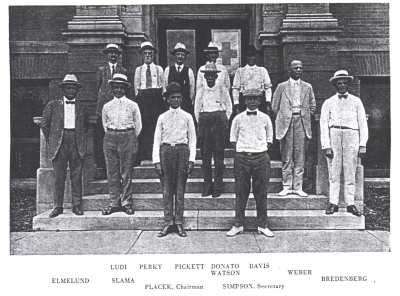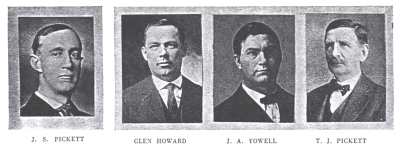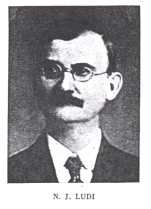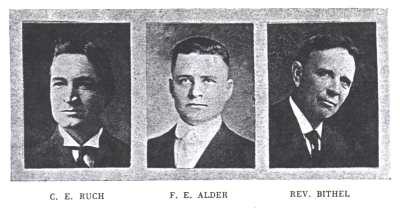 SAUNDERS COUNTY COUNCIL OF DEFENSE
SAUNDERS COUNTY COUNCIL OF DEFENSE
Immediately upon the declaration of war with Germany, April 6, 1917, the mutterings of discontent developed among quite a class of citizens who were promptly denominated as pro-German, and in fact as disloyalists.
To suppress this flood of embarrassing and obstructing tactics suddenly let loose in antipathy to every war move of the American Government, the nation found it necessary to organize a Council of Defense. This was followed immediately by the promulgation of State Councils of Defense at the request of national authorities, and the organization of County Councils followed as a logical sequel of the effort to bring the movement down close to the people, thus increasing its power and efficiency in the various communities and sub-divisions of the county. It was planned as a dragnet to cover and convict disloyalty in every form and in all its various species of obstructing the endeavor then being made to organize, equip, move and feed millions of soldiers, regular, volunteer and draft, demanded in a herculean effort to defeat the visions of the world domination of the German Empire and its allies and establish the peace of. the world upon standards which should prove democratic and permanent.
These different forms of obstructing governmental efforts consisted of deprecatory and disloyal remarks regarding the objects, motives, and purposes for which the nation had felt called upon to declare war against the enemies of civilization; disloyal acts thru which citizens sought to deprive the military forces of the nation and its foreign allies of breadstuffs and other food necessary in sustaining armies of intensive fighters both here and on European battlefields; failures to subscribe or contribute to the various war activities designed to finance the establishment of the largest military undertaking of modern times in the shortest possible time; violation of foreign language laws passed by the legislature; the discouraging of pro-German sentiment and sympathy manifested in private utterances and public display such as the flaunting of German bunting, flags or crown pictures designed to foster alien sympathy and destroy American unity; obstructing the enlistment or draft of persons competent or subject to military service; rebuking and controverting the hostile attitude of individuals toward the duly constituted authorities and the Council of Defense; obstructing the enforcement of "work or fight" law and many minor infractions of loyal and legal methods enforced by the authorities as necessary to preventing interference with the war work of the various committees.
On the 1st day of June, 1917, the Saunders County Council of Defense was organized at the request of Geo. Neville, chairman of the state Council of Defense, at a mass meeting of the citizens of the county held at the court room in the court house presided over by E. E. Placek who was elected chairman of the County Council of Defense. Guy N. Parmenter was elected secretary. Later removing to Yutan, he was succeeded by Geo. H. Simpson. The other officers were A. Z. Donato, vice chairman, and Emil E. Wolf, treasurer. The organization was completed by the election of the following, who with the officers above mentioned, constituted the council of 15 members desired by the State Council: Bert Lyman, Cedar Bluffs; Chas. Davis, Pohocco; R. H. Watson, Center; W. C. Elmelund, Valparaiso; Alex Laverty, Ashland; Chas. Perky, Ed. Bredenberg, C. H. Slama, Dr. E. O. Weber, T. J. Pickett and N. J. Ludi of Wahoo.
The executive sessions were held each Wednesday afternoon at the court house, where persons summoned for that purpose appeared and made defense to acts, utterances, or violations of pro-war statutes of the state. During the 19 months in which the Council of Defense existed 88 formal complaints were filed with the council by which individuals were caused to appear and defend themselves against charges of disloyalty in some offensive form as outlined above. For convenience we shall group them into seven classes and give the number of complaints in each as follows:
Disloyal remarks 31, failure to subscribe or contribute to war activities including Red Cross 27, hostile attitude toward the authorities or Council 7, violation of the foreign language laws 6, obstructing the draft 5, expressing pro-German sentiment and displaying obnoxious emblems and crown pictures 11, opposing the "work or fight" law 1.
In addition to the above a large number of cases were handled by the chairman and secretary thru correspondence with precinct representatives without the publicity that always followed the attendance of a "suspect" before the defense board. The latter class of cases never went before the council for adjudication, and thus the obnoxious acts of a large element were never known beyond the files in the office of the secretary, where the chairman dictated correspondence to the accused parties whose promises to abide by the rules of conduct prescribed by the council was always accepted and generally faithfully kept. The source of trouble which eventually brought the county into state-wide prominence was the action of the council in prohibiting public meetings alleged to be of a pro-German nature. In several instances meetings about to be held were dispersed which brought on a conflict with the Non Partisan League leaders and served as a precedent which was afterward followed by other counties who adopted the Saunders County method, thus indirectly advertising the county as the first Nebraska battlefield of the world war on which was enacted the bloodless encounter termed the "The Battle of Wahoo."
The expenses of the council were met by an assessment of $10.00 upon each member of the executive committee. This furnished all the "sinews of war" needed, and no contributions were asked from the people as was the custom in some other counties which donated several hundred dollars to the support of its Council of Defense.
The council was dissolved January 3, 1919, by Gov. Neville, as one of his last official acts before retiring from office.
 THE COUNTY PRESS
THE COUNTY PRESS
The press of Saunders county, always progressive in civic affairs, entered the campaign of winning the war with vigor and fearlessness. Their activities in favor of every loyal movement were unceasing and their denunciation of harmful propaganda unsparing. To their credit be it said that the newspaper men of the county stood squarely behind the many patriotic endeavors to finance the huge undertakings of the war and navy departments. They gave freely of space and energy to every cause that promised to furnish sustenance for the army and navy, supplies for the sick and disabled, and enlistments for the ranks. All organizations designed to aid and assist in ministering to the wants of all the armed forces of the nation used the columns of the press freely in spreading the appeals for war time necessities. In large measure the press was responsible for the unexcelled record made by the Red Cross and War Stamp drives. For these reasons the county press is entitled to this honorable mention in the Honor Roll as a tribute to its fidelity to a just and worthy cause.

 HISTORY OF FOUR-MINUTE-MEN
HISTORY OF FOUR-MINUTE-MEN
When on April 6, 1917, Congress recognized the existence of a state of war between the Imperial German government and the people of the United States, it became necessary immediately to mobilize not alone the physical but also the mental and spiritual powers of America.
Sudden and violent transitions had been required of the people; first, from a state of comparative security under the so-called Sussex pledge to a state of armed neutrality occasioned by the note of January 31, 1917, announcing the commencement of unrestricted submarine warfare on the following day; and second, to an actual state of war because of the carrying out of the threat contained in the note.
The successful transition of a nation from a peace basis to a war basis depends upon the ready and hearty support of all classes. Such support can come only when people know the motives which prompted their government to declare war to be just and sufficient.
To the end that every community might have accurate information concerning the various war measures and activities, undertaken by this country, the organization known as the "Four-Minute-Men" was formed in April, 1917. The organization was under the national directorship of Donald M. Ryerson until June 16, 1917, when Mr. Ryerson entered the navy and William McCormick Blair became director. Mr. Blair served until August 31, 1918, when he entered the field artillery and was succeeded by William G. Ingersoll.
Nebraska organized September 12, 1917, with Prof. M. M. Fogg of Lincoln as director. Altho organized late, Nebraska's record was phenomenal. At the close of the Fourth Liberty Loan Campaign 98.4 per cent of Nebraska's 334 chairmen reported, and on the efficiency honor roll of the Third Liberty Loan Nebraska ranked first in the number of chairmen and the number reporting, ranking second among the states of the union in the total number of speakers. Nebraska's final record shows that she ranks first in the number of chairmen who earned commissions and the number of speakers who earned insignia.
The work in Saunders county was carried on under the leadership of the following local chairmen: Rev. L. E. Snapp and R. B. Carey, Ashland; W. G. Putney, Cedar Bluffs; Dr. F. T. Wright, Ceresco; Cyril Svoboda, Prague; C. W. Greene, Valparaiso; Prof. F. E. Alder and P. P. White, Wahoo; Rev. W. X. Magnusson, Malmo; Robert H. Park, Yutan; H. N. Nelson, D. S. Domer, and Andrew Bowen, Weston.
These men and the 45 speakers working with them went into motion picture theaters, churches, and other public places and delivered the war messages of the Government thru 41 speaking campaigns. Outside of local activities in the towns the Four-Minute-Men carried their work into the rural communities of the entire county. In the evenings, when the patrons of the various school districts met, at their respective school houses to do their bit in some war activity a Four-Minute-Man could be had, for the asking, who could explain fully the matter in hand.
It was an almost daily occurrence for some speaker to drive 25 or 30 miles into the country to help put across some important drive for funds or explain some war activity to the people. The importance of the work of the Four-Minute-Men in bringing about harmonious and enthusiastic support of all war activities can hardly be overestimated.
After the signing of the armistice the services of the Four-Minute-Men were no longer needed, and consequently on the 24th day of December, 1918, the organization was disbanded.
|









